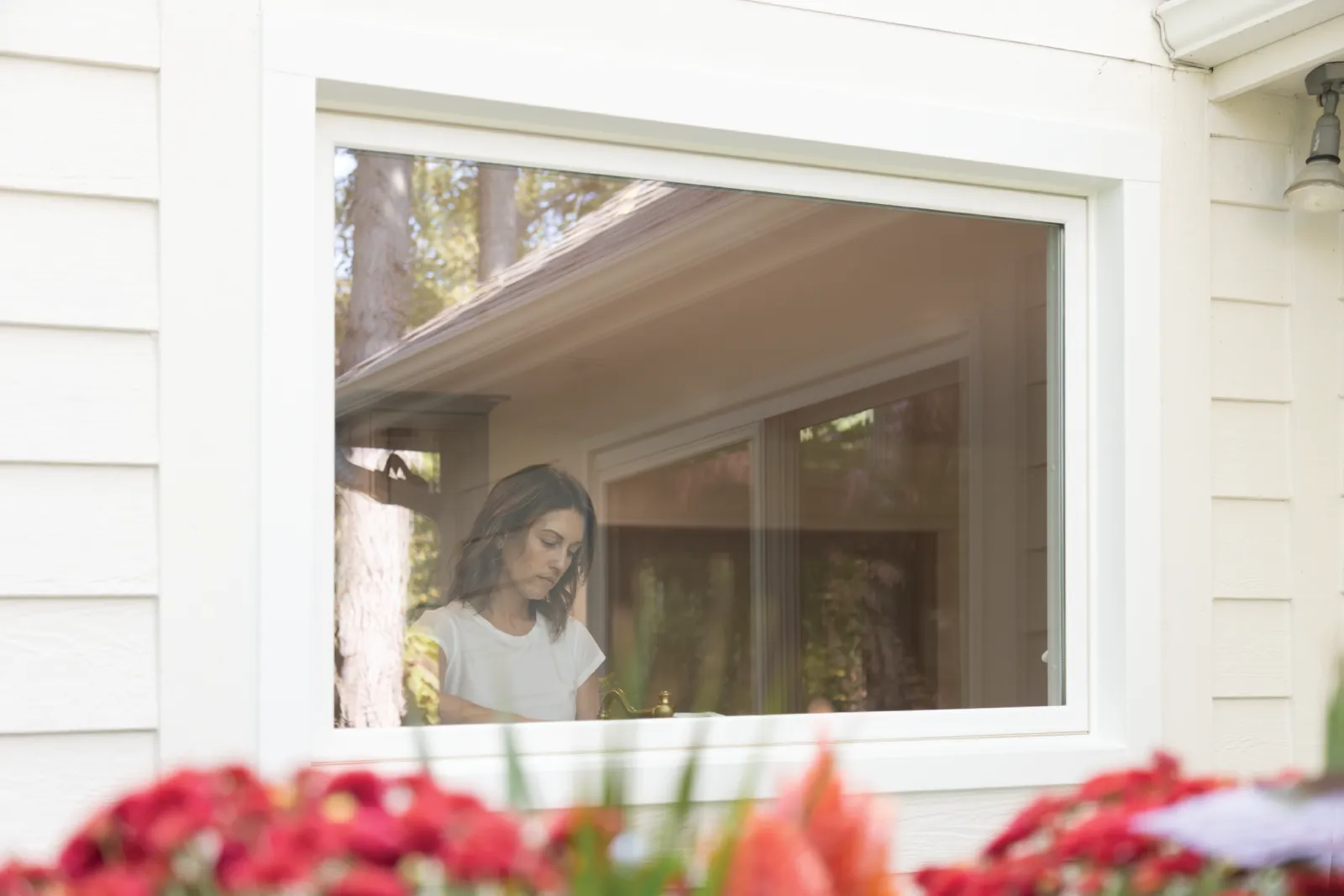Zooming traffic, rattling lawnmowers, and barking dogs—even in a so-called "quiet suburban neighborhood," life can still be really noisy!
While day-to-day disruptions aren't such a bother while you're out and about, chances are, you want to keep these loud sounds from disrupting the quiet inside your home. Replacement windows are one of the most effective ways to keep distracting noises outside where they belong—but some options are better than others.
Below, we'll compare the noise-resistant features of double- and triple-pane windows so you can decide which option is best for preserving the peace in your home.

What Is the Difference Between Double-Pane and Triple-Pane Windows?
Double-Pane Windows
As the name suggests, a double-pane window system includes two panes of glass with a dense gas between them. This extra layer of glass and the insulating gap between the panes improve the window system's overall energy efficiency, security, and noise reduction.
Triple-Pane Windows
Triple-pane windows have three panes of glass with two gas-filled spaces between them. Because of the added glass and insulating space in the window system, triple-pane windows are effective at temperature regulation and sound transmission. However, there may be some downsides that you would want to consider before going this route.
How Is Noise-Blocking Effectiveness Measured in a Window System?
We measure the sound isolation of doors, windows, and walls by measuring their Sound Transmission Class (STC). The higher a window's STC rating, the better its ability to block, muffle, or dampen outside noises.
STC ratings for windows range from 18 to 38.
On the low end of the scale (18), someone could talk to you through a window, and you would be able to hear them with crystal clarity. On the high end (38), this person could be trying to have a conversation through the glass, but you wouldn't be able to hear them at all.
Another measurement of sound transmission is the Outdoor Indoor Transmission Class (OITC). This measurement focuses more on low-frequency noises such as bass-heavy music, home theatre noises, or noise from heavy equipment operation which STC does not detect. As with the STC rating, a higher OITC rating means better noise blocking.
Which Elements and Features of a Window System Can Reduce Noise Transmission?
The following elements of a window system all work together to make the window have a higher STC rating and offer the greatest sound resistance:
Glass Thickness
Installing a window system with glass panes of different thicknesses helps the window system dampen sounds at various frequencies.
Pane Distance
Increasing the distance between panes of glass in a window system can elongate the amount of time sound waves spend traveling through it, helping to dampen noises by the time they reach the home's interior.
Gas Filling
Double- and triple-pane windows both can include gas fills (such as argon or krypton) between each window pane. Sound travels slower through gases than air, so these dense gases act as insulators that slow the transmission and, therefore, reduce outside noises. It is important to note, however, that most builder grade windows do not include gas fills.
Laminated Glass
Some window systems come with laminated glass, which consists of a layer of thin resin called polyvinyl butyral (PVB) between two panes of glass. This material not only makes glass shatter-resistant but also helps to muffle sounds in noisy neighborhoods.
Weatherstripping
Sound waves travel most quickly through openings in window frames, so properly sealing your windows' cracks and gaps will significantly diminish loud noises.
Precise Installation
Whether you install double- or triple-pane windows, investing in professional installation from an expert local contractor, like NG Windows, will ensure your windows offer the best and longest-lasting sound performance possible.
Double vs. Triple-Pane Windows: Which Windows Are the Most Soundproof?
Now that we understand the difference between double- and triple-pane windows, what an STC rating is, and the elements that make a window system noise-resistant, let's determine which windows are more sound resistant—double or triple-pane windows.
STC Rating
As we mentioned earlier, STC ratings for windows can range from 18 to 38:
Single-pane windows usually have an STC rating between 26-28.
Double-pane windows have an STC rating between 26-32.
Triple-pane windows have an STC rating between 28-34.
Laminated windows have an STC rating as high as 40 or more.
As you can see, no window system will achieve complete soundproofing with an STC rating of 38. However, both double-pane and triple-pane windows can get pretty close!
Noise-Resistant Elements
The noise-resistant elements in a double-pane or triple-pane window will determine its ability to reach the higher end of the STC rating scale.
For example, double- and triple-pane windows with varying levels of glass thickness tend to have higher STC ratings.
Likewise, the greater the distance between panes of glass the better, especially when this distance is filled with dense inert gases. In this category, double-pane windows tend to be more soundproof since it's easier to space out two glass panes versus three.
Other soundproof features, like laminated glass and weatherstripping, as well as precise installation, can improve the sound-resistant qualities of both double- and triple-pane windows.
The Final Verdict
So, are double-pane or triple-pane windows more soundproof?
Triple-pane windows can achieve a little higher STC rating than double-pane windows. However, both double- and triple-pane windows are significantly better at blocking noise than single-pane alternatives, especially after incorporating soundproof features like varying glass thicknesses, distance between the glass panes, and dense gases to slow sound transmission.
There are many more considerations when it comes to windows, such as the look and durability of the frames, viewable glass, paintability, and warranty that all must be considered.
| Guide to Common Window Problems - Outside Noise |
|---|
| If you enjoyed this article, check out more information in our comprehensive guide outlining all you need to know about window sound dampening and handling loud noises through window installation. Read the "Guide to Common Window Problems - Outside Noise" |
Install Sound Reducing Infinity from Marvin Windows with NG Windows
When you need help deciding which windows are the best choice for reducing the noise in your home, our experienced local team at NG Windows would be happy to help you choose new windows.
As the exclusive Infinity from Marvin® contractor in Georgia, we offer specialized installation and a high level of knowledge about these durable, high-quality fiberglass windows. In addition to noise reduction, learn more about what makes these industry-leading windows and our window installation service stand out above the competition!









